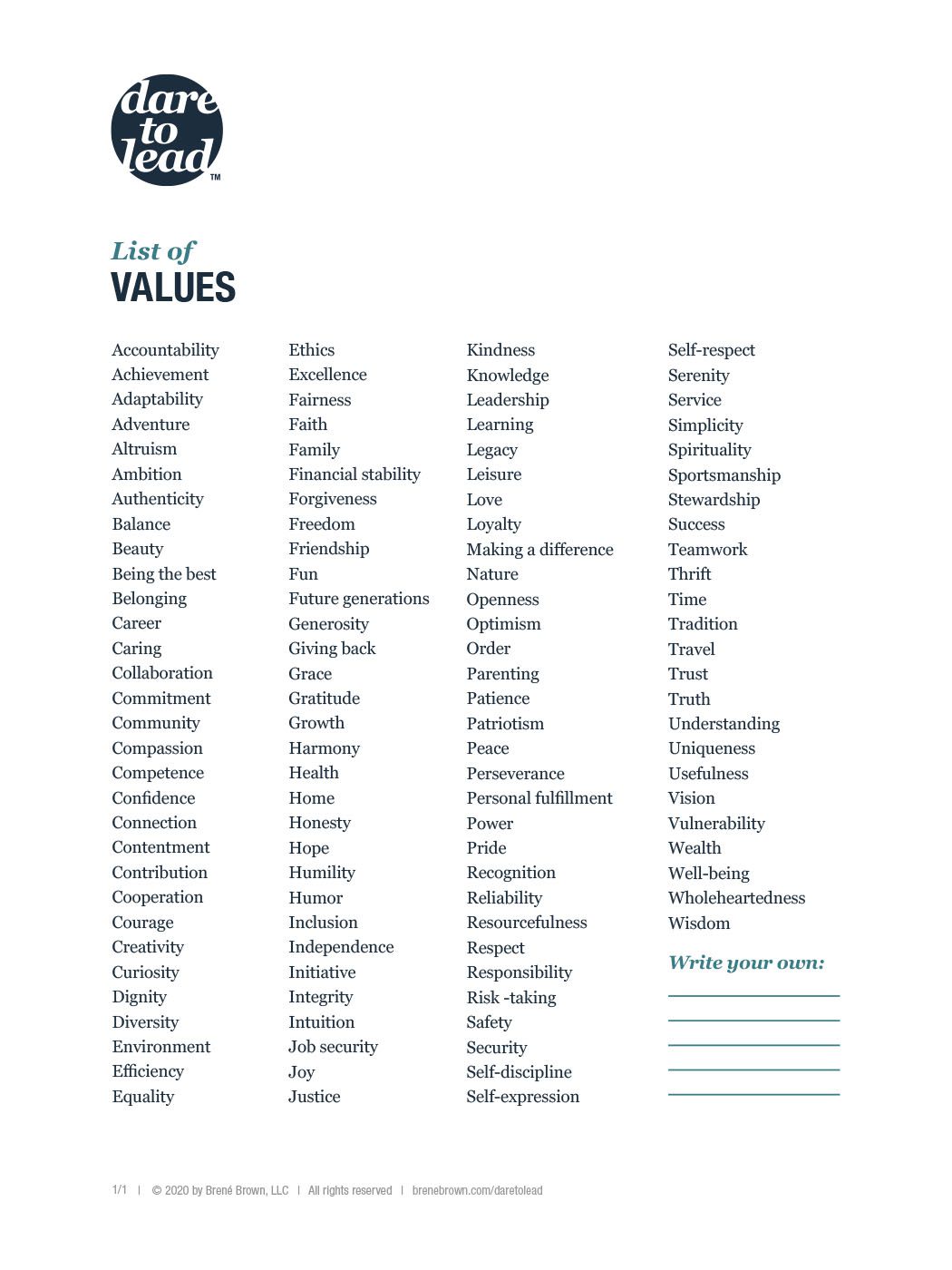Personal Values For Millennials and Gen Z: Who The Hell Are You
Pop Quiz! What defines your identity more than your favorite Netflix show? Your personal values!
The sad part is that most young adults feel a disconnect between their daily lives and their true passions.
This feeling isn’t uncommon – it all boils down to personal values. Plain and simple.
Your personal values are like your internal compass, guiding you toward a life that feels fulfilling and meaningful.
They’re the things that matter most to you – the principles that shape your decisions and actions.
Think of it like your favorite music genre. Genres like rock might represent values like individuality and rebellion, while pop might be about connection and having fun.
Your values playlist is what makes your life unique!
Here’s the thing: unlike Hitler (whose rigid routine might reflect values like control and order), Millennials and Gen Z take things a step further.
We don’t just have values – we wear them on our sleeves (or at least on our social media feeds). Our values are intertwined with our identity.
That’s why self-improvement without considering your values is like trying to build a house without a blueprint.
Sure, you might end up with some walls, but will it be the kind of home you truly desire?
Knowing your values helps you define what “better” means for YOU.
For example, your bestie invites you to a nice gathering at the local bar where you know the conversation won’t be as deep or valuable as you want it to be.
If depth and quality time is one of your core values, you might politely decline and suggest an alternative instead.
It’s a small decision, but one that ripples outward, shaping the kind of person you strive to be.
This reflects to anything you care about the most whether you want to be a CEO, An X-Games adventurer, a writer or an ice cream truck driver.
The possibilities are endless!
But here’s the catch: if we all just drift along without a clear sense of direction, things could get messy.
Living with intention, guided by our values, is what helps us create a future we can all be proud of.
Look, nobody wants to end up like that meme of the dog sitting in a burning house saying ‘This is fine.’
Let’s figure out your values before things get spicy and be in control.
What Are Personal Values?
Personal values are fundamental beliefs that guide your decisions and shape your overall life trajectory.
They act as an internal GPS, helping you navigate complex situations and prioritize what truly matters.
Think of them as your North Star, keeping you on track even when the waters get rough.
For instance, if environmental sustainability is a core value, you might actively support eco-friendly initiatives or choose products with a smaller carbon footprint.
The Purpose of Personal Values:
-
Clarity and Direction: Values provide a framework for decision-making.
When faced with a dilemma, your values act as a filter, helping you choose the path that aligns with what you believe is important. -
A Fulfilling Life: Living by your values fosters a sense of purpose and satisfaction.
Imagine achieving a goal that aligns perfectly with your values – the feeling of accomplishment and fulfillment is unmatched.
In essence, personal values are the cornerstone of a meaningful and purposeful life if you act upon them.
Think of them as core principles that define who you are at your most authentic self.
What you choose to adopt internally ends up being what you do externally.
But here’s the thing about values, while generally positive, they can sometimes lead you down a dark path if not carefully considered.
Here’s an example:
Let’s say “loyalty” is a core value for you. Loyalty is a great thing – it means sticking by your friends, family, and those who matter to you.
However, imagine a person blindly following a friend who is constantly getting into trouble.
They might justify covering for their friend’s lies or bad behavior out of loyalty, even though these actions are ultimately harmful to both parties.
So what does that mean?
It means we should not only examine the value itself, but also the context in which it’s applied.
Here’s how to ensure your values guide you in a positive direction:
-
Consider the Consequences: Ask yourself, “How will my actions, driven by this value, impact myself and others?”
In the loyalty example, blindly covering for a friend could damage your reputation and hinder their growth at the same time. -
Seek Balance: Values often work best in conjunction with others. For example, loyalty can be balanced with honesty or integrity.
In the previous scenario, you could approach your friend honestly and offer support, instead of enabling their bad behavior. -
Context Matters: The way you express a value can vary depending on the situation.
For instance, loyalty to your family might mean setting boundaries and having tough conversations when necessary.
Your values are a powerful tool, but like any tool, they require careful handling.

The Disconnect Between Values and Actions
We’ve established that personal values are crucial for a meaningful life.
However, there’s often a frustrating gap between what we believe in and how we actually behave.
This disconnect can lead to a feeling of inauthenticity and hinder our personal growth.
Here’s why this disconnect happens:
1. Lack of Self-Awareness: Sometimes, we haven’t fully explored our core values.
We might have a vague idea of what’s important but haven’t taken the time to truly define them.
This lack of clarity makes it difficult to align our actions with our beliefs.
2. Competing Values: Life throws us curveballs with situations that demand conflicting values.
For example, you valuing honesty might make you struggle to tell a white lie to protect a friend’s feelings.
3. External Pressures: Social norms, peer pressure, and societal expectations can all influence our behavior, sometimes pulling us away from our core values.
We might prioritize the “shoulds” and “oughts” of society over what we truly believe in.
That’s why existential crisis happens later down the line as a result of internal conflict over unproperly-assessed self beliefs or values.
Here are more examples:
-
An environmentalist Drives a Gas-Guzzling SUV: Someone who values environmental sustainability might choose a large, fuel-inefficient car due to practicality or societal pressure, despite its environmental impact.
-
Health-Conscious Person Makes Unhealthy Choices: Someone who values health might indulge in unhealthy snacks under stress or social pressure, even though it contradicts their desire to live a healthy lifestyle.
-
Honest Person Witholds Information to Avoid Conflict: Someone who values honesty might avoid telling a friend a difficult truth to prevent conflict, even though dishonesty creates a strain in the long run.
Choosing Your Core Values
Choosing core values is a personal and subjective process that requires self-awareness, reflection, and introspection.
This is where so many people have it wrong because they choose values under influences that shape their decisions.
Here’s why this might happen.
Our core values are shaped by a complex interplay of factors:
- Upbringing and Family: The values instilled by our families during our early years play a significant role in how we see the world and what we value as adults.
- Life Experiences: The challenges and triumphs we encounter throughout life help refine and solidify our values, good or bad sadly.
- Role Models and Mentors: The people we admire and the lessons we learn from them can significantly influence our value system. (Bieber Believers?!)
- Societal and Cultural Influences: The norms and expectations of the societies we live in can shape our values to some degree as well.
So to avoid that, here’s the scientific way to pick your values.
To begin with, choosing any value involves identifying your strengths, weaknesses, and personality traits, and aligning them with your personal and professional goals.
If you are unable to identify what truly sets you apart or your Achilles heels, ask your close friends about that. (sometimes, you’d be shocked to hear how others are perceiving you!)
Once you have identified the pros and cons in you that inform your core values, aligning your behavior and actions with them is essential.
This involves breaking old patterns and habits that are inconsistent with your values and creating new ones that are aligned with them.
According to a recent paper published in Frontiers in Psychology, it suggests that habits are formed through repetition, consistency, and association, and become automatic over time.
In other words, our brain are wired for reward.
When we behave in ways that align with our values (e.g., helping a friend in need), the reward system releases dopamine, a feel-good neurotransmitter.
This reinforces the positive association and motivates us to repeat the behavior.
So, the next time you make a value-driven decision, give your brain a high five!
It’s literally rewarding you for staying true to who you are.
Just remember that any picks you identify with or planning to incorporate into your life are dynamic and always evolving as you evolve and grow too.
The key point is to pick something that aligns with your most authentic self and future aspirations.
Now that you understand how to pick a value, what are these values to begin with?
Here’s a comprehensive list from Dare to Lead

How Values Are Formed.
Nature vs. Nurture: A Dynamic Duo
Imagine your values as a delicious (and surprisingly complex) cake.
The recipe involves a blend of two key ingredients:
- Nature (Genetics): Your genes play a role in shaping our temperaments and predispositions.
For instance, someone with a naturally high “agreeableness” might find values like cooperation and compassion particularly appealing. - Nurture (Environment): From the moment you were born, your experiences shape you. Family dynamics, cultural norms, and influential figures all contribute to the values you develop.
For example:
Remember that cool uncle or father figure who always volunteered at the animal shelter?
His dedication to compassion might have subtly influenced your own developing sense of empathy.
That is how observation is so influential. (remember the good and bad events you witnessed growing up that have shaped your outlook on many things now).
In fact, brain imaging studies even show that observing others’ behaviors activates similar areas in our brains as if we were performing those actions ourselves.
This “mirror neuron” system allows us to internalize values through observation and social interaction.
Additional scientific ideas to check for if you are a nerd like me:
Freud’s stages of psychosexual development, Kohlberg’s stages of moral development, and Piaget’s two-stage process of cognitive development are some of the most prominent theories that explain how values are formed and evolve over time

How to Balance Personal Values With Practical Considerations
What happens when those values clash with the realities of daily life?
Let’s face it, sometimes the “adulting” world throws hardships that can make living by your values feel tricky.
Remember that summer internship you dreamed of for college?
Now, post-grad, the thought of a 9-to-5 grind makes you want to scream. It’s totally normal for your values (and your goals) to evolve.
What matters is to:
Prioritize with Nuance:
Not all values are created equal. Identify your top 3-5 core values.
These are the non-negotiables that guide your major life decisions.
For your remaining values, consider a sliding scale of importance. This allows for flexibility when faced with practical constraints.
Embrace Creative Problem-Solving:
Let’s say “creativity” is a core value, but your current job feels stifling.
Instead of quitting impulsively, brainstorm solutions! Can you negotiate for a more creative role within your company?
Can you pursue creative hobbies outside of work or maybe a side hustle?
There’s often a middle ground where you can fulfill both your values and practical needs. (There’s often a way to unleash your inner artist without sacrificing your Netflix subscription!).
The Power of “Small Wins”:
Living your values doesn’t always require grand gestures. Focus on incorporating small, daily actions that align with your beliefs.
For example, if “environmental sustainability” is a core value, you could start by packing a reusable lunch bag or choosing public transportation when feasible.
These small wins add up over time, creating a life that reflects your values.
Open Communication is Key:
Be open with family, friends, and colleagues about your values. This transparency fosters understanding and support.
(Sometimes they might not support that, that’s good, now you know they shouldn’t be the main characters in your life)
Perhaps your partner shares your value of “adventure,” so you can plan budget-friendly weekend getaways.
If work-life balance is important to you, set boundaries around your work hours and make sure you have time for yourself and your family
Open communication allows you to navigate practicalities together and find solutions that work for everyone.
Remember, Growth is a Journey:
Balancing values with practicality is a continuous process. There might be times when you have to compromise.
Maybe you have to temporarily take a job that doesn’t quite align with your dreams.
Don’t beat yourself up – learn from the experience and adjust your approach.
The key is to keep moving forward, striving for a life that aligns with your most authentic self.
Free Online Value Assessment Tools to Figure Your Values
Life Values Inventory
The LVI is a free values clarification and personal development program that helps you clarify your values and serves as a blueprint for effective decision-making and optimal functioning.
The program is made of five steps, with the first three making up the assessment portion and the last two presenting your results along with strategies for future development.
This covers areas like your career and life role development, managing life transitions, team building and relationships, and behavior.
Valued Living Questionnaire (VLQ)
This test is a widely accepted measure of estimating the domains of life values that govern our actions.
The VLQ originally evolved as part of the Acceptance and Commitment Therapy and is now used to evaluate our meaning of values and how they have impacted our activities over the past week.
The scale has two sets of questions, one that evaluates your sense of value and one that estimates how consistently you have followed your values over the past seven days.
The test covers 10 areas:
- Family
- Marriage and intimate relationships
- Parenting
- Friendship and interpersonal relationships
- Professional life
- Academic life
- Leisure and recreation
- Spirituality
- Citizenship
- Self-care
Personal Value Test
Provided by Personal Value, this test can help you discover your personal values and prioritize them.
It compiles a list of 62 personal values that covers many different approaches to value definition and covers the space of personal values as accurately as possible while maintaining clarity and ease.

‘Should I Eat This pizza’. Decoding Your Core Values
We all make countless decisions every day, some are good, others seemingly dumb.
But have you ever stopped to consider the deeper meaning behind your choices?
The truth is, your daily decisions, big or small, can act as a window into your core values.
Imagine yourself at a crossroads.
Do you choose the healthy salad for lunch, aligning with your value of “wellness,” or the tempting burger, perhaps reflecting a temporary desire for “indulgence”?
By taking a moment to analyze the “why” behind your choices, you begin to identify the values driving your actions.
This process of self-reflection isn’t about judgment. It’s about awareness.
Over time, patterns will emerge.
Perhaps you consistently choose the quick and easy option, prioritizing “efficiency” over “creativity.”
Maybe you find yourself drawn to activities that allow you to help others, highlighting the value of “compassion” in your life.
Identifying these inconsistencies between your desired values and your lived reality is a crucial step.
This newfound awareness empowers you to make conscious choices that better align with who you want to be.
Now, that doesn’t mean you should never eat that pizza or brownie or whatever you fancy at all, it just means staying true to your core value as long and as sincerely as possible.
Think about it this way:
Think back to a time you absolutely crushed it – maybe you spearheaded a successful project or delivered a killer presentation or any other minor or big success,
What emotions did this peak experience evoke? Did it ignite a sense of pride in your leadership skills or perhaps a desire to motivate others?
These feelings can highlight values that resonate deeply with you.
Conversely, challenging experiences can be equally revealing.
Did a difficult breakup leave you yearning for stronger communication in your relationships?
This pain might point towards the value of “compassion” or “emotional intelligence” playing a more prominent role in your life.
So if you put it all together, reflecting on both the triumphs and the tribulations of your life, you can start to piece together the values that form the foundation of who you are.
These experiences, both positive and negative, shape your perspective and what truly matters to you.
So, take some time to delve into your past and the type of decisions you made.
You might be surprised by the valuable insights you uncover and can open the door for you to identify what needs to be done.

Conclusion
Living by your values as a Millennial or Gen Z can feel daunting at first.
It’s like stepping up to the edge of a cold pool – the fear of the unknown can be paralyzing.
But here’s the secret: once you take the plunge, something magical happens.
Think about it – after a tough run, the initial ache gives way to a powerful sense of accomplishment.
Telling the truth might bring temporary discomfort, but the relief and trust it fosters are priceless.
The same goes for ditching outdated beliefs. Imagine the liberation of shedding a highly judgmental past and embracing more acceptance.
It might seem strange at first, but the reward is an authentic self you can finally be proud of.
Living by your values is like that initial shock of cold water – it hits you hard at first.
But soon, the discomfort fades, replaced by a deep sense of peace and a clearer understanding of who you truly are.
You realize, with a touch of disbelief, “Why didn’t I do this sooner?”
Living authentically becomes effortless, fueled by the undeniable benefits it brings to your life and the lives of those around you.
To give you a bit of a personal intake, I have never been freer than I’m now as I’m designing and living the life I want to have and striving for the future I desire.
Nothing beats that!
So, take the plunge, embrace your values, and discover the freedom that awaits!
Did you enjoy this blog post? What are your thoughts or ideas you want to share?
I’d love to read your comment below.
Until next time, stay free!



